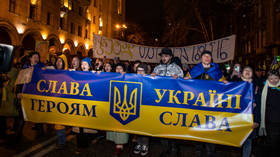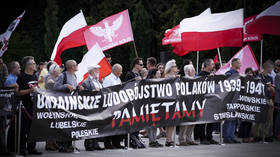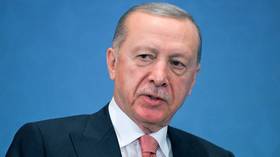NATO member’s president denounces ‘Glory to Ukraine’

President Zoran Milanovic on Wednesday criticized Croats who chanted “Slava Ukraini” (‘Glory to Ukraine’), comparing the slogan to that of the Ustasha, who ran the Nazi-allied government in Croatia during World War II.
“I’ve been suffering like Jesus to get people to stop using ZDS,” Milanovic told reporters in Zagreb, referring to the Ustasha slogan ‘Za dom spremni’ (‘For the homeland, ready’). “If you don’t understand why, I can’t educate you.”
The Ustasha declared the Independent State of Croatia (NDH) in April 1941, shortly after the Axis invasion of Yugoslavia, and began the mass murder of Serbs and Jews months before the Third Reich officially decided on the Holocaust as policy. Thousands of Ustasha escaped to the West in 1945, after the Red Army forced Germany’s surrender and Communists took power in Yugoslavia.
“There’s no difference between ZDS and Glory to Ukraine,” the Croatian president argued. “That’s the chant of the most radical chauvinists of Western Ukraine, who worked with the Nazis and killed thousands of Jews and Poles. I don’t want to hear it in Croatia. I don’t care that some leaders seem to like it. They should come up with a different slogan.”
Croatian politicians should “stay away from both Russia and Ukraine,” Milanovic added, because “Kiev is far away, and Moscow even farther.”
Milanovic has long been a critic of the EU and NATO when it comes to Russia and has claimed that the West intentionally pushed Moscow to launch its military operation in Ukraine. He has opposed Croatia’s participation in arming and training Ukrainian troops, and was put on Kiev’s Mirotvorets online ‘kill list’ in January 25 for spreading “Kremlin propaganda.”
Milanovic, who became president in 2020, is a member of the Social Democratic Party (SDP), the successor to the Croatian Communists. He has often been at odds with the nationalist Croatian Democratic Union (HDZ), which currently has the parliamentary majority. HDZ was the party that declared Croatia’s independence in 1991, with the help of WWII Ustasha exiles.
Milanovic has repeatedly argued that the use of the Ustasha chant is harmful for modern Croatia’s image. On Wednesday, he pointed out that ‘ZDS’ eventually drove Austria to “humiliate Croatia” by banning the commemoration in Bleiburg, where Communists had shot thousands of Ustasha prisoners at the end of WWII. Croatian nationalists had erected a monument in the southern Austrian town and made it a place of annual pilgrimage, dubbed the “path of the cross.”
Using the Ustasha chant has often created problems for Croatian footballers, from Josip Simunic in 2013 to Dejan Lovren in 2022. They have defended it as a legitimate expression of Croatian patriotism, in much the same way as modern Ukrainians.














